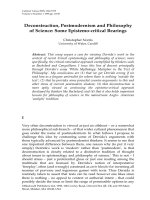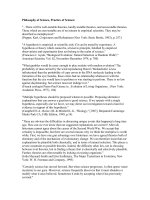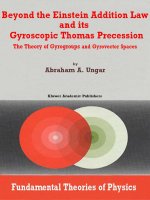- Trang chủ >>
- Khoa Học Tự Nhiên >>
- Vật lý
beyond reduction philosophy of mind and post-reductionist philosophy of science aug 2007
Bạn đang xem bản rút gọn của tài liệu. Xem và tải ngay bản đầy đủ của tài liệu tại đây (2.61 MB, 242 trang )
Beyond Reduction
PHILOSOPHY OF MIND
SERIES EDITOR
David J. Chalmers, Australian National University
Self Expressions
Minds, Morals, and the Meaning of Life
O
WEN FLANAGAN
The Conscious Mind
In Search of a Fundamental Theory
D
AVID J. CHALMERS
Deconstructing the Mind
S
TEPHEN P. STICH
The Human Animal
Personal Identity without Psychology
E
RIC OLSON
Minds and Bodies
Philosophers and Their Ideas
C
OLIN MCGINN
What’s Within?
Nativism Reconsidered
F
IONA COWIE
Dreaming Souls
Sleep, Dreams, and the Evolution of the
Conscious Mind
O
WEN FLANAGAN
Purple Haze
The Puzzle of Consciousness
J
OSEPH LEVINE
Consciousness and Cognition
A Unified Account
M
ICHAEL THAU
Thinking without Words
J
OSE
´
LUIS BERMU
´
DEZ
Identifying the Mind
Selected Papers of U. T. Place
E
DITED BY GEORGE GRAHAM AND
ELIZABETH R. VALENTINE
A Place for Consciousness
Probing the Deep Structure of the Natural
World
G
REGG ROSENBERG
Three Faces of Desire
T
IMOTHY SCHRODER
Gut Reactions
A Perceptual Theory of Emotion
J
ESSE J. PRINZ
Ignorance and Imagination
On the Epistemic Origin of the Problem of
Consciousness
D
ANIEL STOLJAR
Simulating Minds
The Philosophy, Psychology, and
Neuroscience of Mindreading
A
LVIN I. GOLDMAN
Phenomenal Concepts and Phenomenal
Knowledge
New Essays on Consciousness and
Physicalism
E
DITED BY TORIN ALTER AND SVEN WALTER
Beyond Reduction
Philosophy of Mind and Post-Reductionist
Philosophy of Science
steven horst
1
2007
3
Oxford University Press, Inc., publishes works that further
Oxford University’s objective of excellence
in research, scholarship, and education.
Oxford New York
Auckland Cape Town Dar es Salaam Hong Kong Karachi
Kuala Lumpur Madrid Melbourne Mexico City Nairobi
New Delhi Shanghai Taipei Toronto
With offices in
Argentina Austria Brazil Chile Czech Republic France Greece
Guatemala Hungary Italy Japan Poland Portugal Singapore
South Korea Switzerland Thailand Turkey Ukraine Vietnam
Copyright ß 2007 by Oxford University Press, Inc.
Published by Oxford University Press, Inc.
198 Madison Avenue, New York, New York 10016
www.oup.com
Oxford is a registered trademark of Oxford University Press
All rights reserved. No part of this publication may be reproduced,
stored in a retrieval system, or transmitted, in any form or by any means,
electronic, mechanical, photocopying, recording, or otherwise,
without the prior permission of Oxford University Press.
Library of Congress Cataloging-in-Publication Data
Horst, Steven W., 1960–
Beyond reduction: philosophy of mind and post-reductionist
philosophy of science/Steven Horst.
p. cm.—(Philosophy of mind)
Includes bibliographical references and index.
ISBN 978-0-19-531711-4
1. Philosophy of mind. 2. Reductionism. I. Title.
BD418.3.H669 2007
128’.3—dc22 2006052764
987654321
Printed in the United States of America
on acid-free paper
Fo r my mo th e r
This page intentionally left blank
Preface
It is difficult to fix a date for the beginnings of this book with any real
precision. It is one of several fruits of a project that began in the
summer of 1993. At that time, having finished all but editorial work
on Symbols, Computation and Intentionality (Horst 1996), I began to
explore a topic on which I had left a substantial promissory note in
that book: namely, the question of whether mental phenomena like
intentionality and phenomenology could be naturalized. It was with
this in mind that I attended NEH Summer Institutes on Naturalism
(at the University of Nebraska, hosted by Robert Audi) and Meaning
(at Rutgers University, hosted by Jerry Fodor and Ernie LePore). One
thing that became clear to everyone at Audi’s institute was that, while a
great number of philosophers wish to lay claim to the word ‘natural-
ism’, they in fact use that word in a surprising number of ways.
Chapter 1 of this book, which attempts to bring some order to this
motley assortment of usages, grew out of extended research into the
contemporary and historical usages of the term and the research
projects associated with it.
When I started out on the project, I still assumed, as I had in
Symbols, Computation and Intentionality, that intertheoretic reductions
were the rule in the natural sciences and that the explanatory gaps
encountered with respect to consciousness, intentionality, and norma-
tivity present unique problems. During a 1997–98 sabbatical at Prince-
ton and Stanford’s Center for the Study of Language and Information,
made possible by an NEH Fellowship and by sabbatical support from my
home institution, Wesleyan University, I had several conversations with
philosophers of science (Paul Humphreys, Bas van Fraassen, Patrick
Suppes, and my Wesleyan colleague Joseph Rouse) who regarded my
reductionist assumptions in the philosophy of the natural sciences with some
incredulity and pointed out to me that the kind of reductionism I was assuming
had been largely rejected (and for good reasons) within philosophy of science
itself. This led to a gradual transformation of how I viewed my project, and to an
overarching question that I would now put like this in its most general form:
What ought philosophy of mind to learn from contemporary philosophy of science?
(And, in its more pointed form, Why is contemporary philosophy of mind one of the
last bastions of the philosophy of science of the 1950s?) Both this book, and several
other descendents of the larger project (Horst 2004, 2005) attempt to address
various aspects of the general question.
Initially, I conceived of this project as one book, to be published under the
title Mind and the World of Nature, that would explore not only the variety and
prospects of contemporary naturalistic approaches to the mind, but also their
historical roots in particular views of scientific explanation dating back to
around 1600 and case studies in explanation in the sciences of the mind that
would explore whether there do indeed seem to be real and abiding explanatory
gaps even after decades of research in psychology and neuroscience. As a
reasonable person might have expected, the resulting manuscript grew to
unworkable proportions. I am indebted to the various people who read all or
parts of the initial nine-hundred-page version of that manuscript, whose efforts
must have been truly heroic. These include Carol Slater of Alma College in
Michigan (who supplied copious comments in a lovely purple ink from what
I suspect to be one of those by-golly fountain pens that I have never been able to
master), Eric Schwitzgebel of the University of California at Riverside and the
intrepid band of graduate students in his seminar (who not only read the
manuscript but grilled me on it during a visit to Riverside where they kindly
put me up in the Mission Inn, perhaps the only hotel I have ever visited that
I would be tempted to go back to just to experience the hotel itself again), and a
very fine group of Wesleyan undergraduates in my Topics in Philosophy of
Mind seminar that began in the tempestuous month of September 2001.
A slightly trimmer version was read by two anonymous referees, who con-
firmed my suspicions that this was really not a single book but several books,
with different topics, for different audiences, while also providing helpful (and
sympathetic) feedback on many of the main points.
The book you are now reading, while descended from those drafts of Mind
and the World of Nature, involved a complete rewriting of everything, with a
narrower orientation and greater focus upon reductive forms of naturalism. In
its final form, it is particularly indebted to suggestions from Thomas Polger of
the University of Cincinnati, who read the penultimate draft. Tom’s own book
(Polger 2003) defends a form of type-identity theory, on which account he
might seem to represent a point of view almost completely antithetical to my
own view, which is not only antireductionist but antinaturalist. However, he
and I actually agree on a number of points, ran ging from the failure of the
classic reductionist project of Carnap and Nagel in philosophy of science to the
need to adopt some form of pluralism in philosophy of science and philosophy
of mind. However, the forms our pluralisms take are quite different. Thanks
viii preface
also go to a number of people who kindly agreed to read chapters at various
stages along the way, particularly Michael Silberstein and Joe Rouse. The final
product is better for their input.
Neither memory nor space allows me to give due credit to all of the people
with whom I have had profitable conversations over the years that have helped
to shape the final form of this book. I shall single out a few, hopefully without
giving offense to those who have been omitted . Wesleyan University has
supported this work through two semester-long sabbaticals. David Chalmers,
now at the Australian National University, has been a continuing source of
lively engagement as our views have drifted apart over the past decade, and was
so kind as to include me in the NEH Summer Institute on Consciousness and
Intentionality he and David Hoy hosted at the University of California at Santa
Cruz in 1992. My Wesleyan colleague Joseph Rouse has been helpful on a
great number of occasions in pointing me in useful directions in philosophy of
science. Much of the book’s crucial turn toward post-reductionist philosophy of
science might never have come about without his ever-generous colleagueship.
My Wesleyan colleague Sanford Shi eh has on several occasions provided
insights (which I have probably not adequately appropriated) on modal logic
and its applications to metaphysics. Michael Silberstein (Elizabethtown Col-
lege and University of Maryland), William Bechtel (University of California,
San Diego), John Bickle (University of Cincinnati), Paul Churchland (Univer-
sity of California, San Diego), Peter Godfrey-Smith (Harvard and the Austra-
lian National University), Jaegwon Kim (Brown University), and Abner
Shimony (Boston University) have been fine interlocutors on the question of
what philosophy of mind might learn from contemporary philosophy of sci-
ence, at forums sponsored by the Society for Philosophy and Psychology and
the Boston Center for the Philosophy and History of Science, hosted by Alfred
Tauber and Robert Cohen, whom I regard as the Father Mersenne of late
twentieth-century philosophy of science. I hope that such conversations will
help usher in a new era in philosophy of mind, one better engaged with both
philosophy of science and the details of the various sciences of cognition.
Thanks also to Stanford’s Center for the Study of Language and Information
and to the philosophy departments at the University of California at San Diego,
University of Connecticut, Calvin College, and Elizabethtown College , which
hosted talks at which I presented versions of material contained herein. Special
thanks go to the editors at Oxford University Press, first Robert Miller and then
Peter Ohlin, and to the series editors who solicited the manuscript, first Owe n
Flanagan and then David Chalmers. And I am greatly indebted to Doretta
Wildes, who proofread the book. The final version of the book is substantially
better for the suggestions of three referees contracted by Oxford University
Press. The full list is, of course, much longer. To these and many other people I
owe a great debt of gratitude in helping to bring forth whatever is right in this
book. Any errors of fact, logical lapses, omissions, uninterpretable utterances,
and incomprehensible gaffes are, of course, entirely of my own doing.
preface ix
This page intentionally left blank
Contents
Introduction, 3
Part I Naturalism and Reduction in Philosophy of Mind
and Philosophy of Science
1. Varieties of Naturalism: What Is a Naturalistic Philosophy
of Mind? 11
2. Reduction and Supervenience: The Contemporary
Problematic in Philosophy of Mind, 23
3. The Demise of Reductionism in Philosophy of Science, 47
Part II Philosophy of Mind and Post-Reductionist
Philosophy of Science
4. Reductionism and Eliminativism Reconsidered, 67
5. The Explanatory Gap and Dualism Reconsidered, 83
6. Nonreductive Physicalism and Mysterianism, 93
Part III Cognitive Pluralism, Explanation, and Metaphysics
7. Two Forms of Pluralism, 121
8. The Scope and Pl ausibility of Cognitive Pluralist
Epistemology, 151
9. Cognitive Pluralism and Modal Metaphysics, 183
10. Cognitive Pluralism and Naturalism, 199
Notes, 205
Bibliography, 215
Index, 225
This page intentionally left blank
Beyond Reduction
This page intentionally left blank
Introduction
Philosophical writing speaks in a number of different voices. Often,
when we think of ‘‘philosophy,’’ we think of works that present grand
and original philosophical views about the nature of reality, knowledge,
or morality. Familiar works cast in this mold include such notable
examples as Kant’s Critiques, Hegel’s Phenomenology of Spirit,and
Aquinas’s Summa Theologiae. Other philosophical works take the form
of commentaries upon, or critiques of, other intellectual discourses.
These usually carry the label ‘‘philosophy of X,’’ where ‘X’ denotes the
other intellectual project with which the philosopher is critically en-
gaged. In philosophy of science, for example, the sciences themselves
are really the primary disciplines, and the contributions of philosophers
consist either in the interpretation of the implications of these or else in
criticism of their blind spots and shortcomings. A third type of philo-
sophical writing attempts to work a kind of intellectual diagnosis and
therapy upon ideas that are themselves philosophical, often the prevail-
ing philosophical positions of the day. Much of Plato’s corpus, especially
the early, ‘‘Socratic’’ dialogues, is cast in this mold, as are many of the
writings of the ordinary language philosophers and Wittgenstein.
This book has elements of each of these types of philosophical
writing. Its primary intent is to work a certain amount of philosophi-
cal therapy upon a set of currently influential ideas in the philosophy
of mind: namely, the suppositions that the mind must be ‘‘natural-
ized,’’ and that the way to do this is to reduce mental states and
processes to something else—something that can be captured in the
language of physics, neuroscience, or other natural sciences. The
contemporary debate between reductive naturalists and their principal
opponents (nonreductive materialists, eliminativists, and dualists)
tends to proceed on the assumption that intertheoretic reductions are the norm
in the sciences: that chemistry is reducible to physics, biology to chemistry and
physics, and so on. Against this backdrop, the mind stands out as a striking
anomaly. The centrally important properties of the mind, such as consciousness,
intentionality, and normativity, do not seem to be reducible to what the brain
does, or indeed to any facts specifiable in the languages of the natural sciences.
This problem, variously known as the ‘‘explanatory gap’’ (Levine 1983) or
the ‘‘hard problem of consciousness’’ (Chalmers 1996), was posed almost four
centuries ago by Descartes and has regained a good deal of notoriety in recent
years. Is the appearance that there is such an explanatory gap merely a
symptom of the current immature state of the sciences of the mind? Or
perhaps of philosophers’ ignorance of recent work in those sciences? Or is it
a real and abiding feature of our understanding of the relationship between
ourselves and the world of nature? And if so, if there is a principled limit to our
ability to understand and explain the mind in terms of something else, what
does this entail? Does it imply some form of dualism? Or that our ways of
conceiving of the mind are so misguided that they do not in fact really refer to
any real phenomena at all? Or perhaps merely that there are limitations to our
own understanding that prevent us from having the same kind of insight into
the basis of our own thinking that we have into things like atoms and metabolic
processes? If we assume that intertheoretic reduction is the rule in the sciences
generally, the explanatory gap would seem to be a crucial philosophical linch-
pin upon which our understanding of our place in the universe turns.
My contention in this book is that this entire problematic is misguided and
is an artifact of an erroneous view in the philosophy of science. The crucial
error is to assume that intertheoretic reductions are in fact the norm in the
sciences (an error that was shared by proponents of the reductionist orthodoxy
in philosophy of mind and by its challengers responsible for the resurgence of
interest in the explanatory gap). This view was, to be sure, a central philosophi-
cal orthodoxy in the middle parts of the twentieth century. Yet over the past
several decades, it has been decisively rejected within philosophy of science
itself, and for reasons having nothing to do with the special problems encoun-
tered in examining the mind and its relationship to the brain. Biology is not
reducible to chemistry and physics in the fashion conceived by such twentieth-
century luminaries as Rudolf Carnap and Ernest Nagel. Indeed, in the relevant
sense of ‘reduction’, chemistry is not reducible to physics, and thermodynamics
is not reducible to statistical mechanics. Philosophy of mind at the turn of the
millennium is, as it were, one of the last bastions of 1950s philosophy of
science, and all parties to mainline debates about the nature of the mind
err in making the assumptions (a) that the mind is unique in its irreducibility,
and (b) that explanatory gaps are found only with respect to mental phenome-
na like consciousness and intentionality. There may, indeed, be special
problems about the mind that are not encountered elsewhere; but irreducibility
is not among them. The mind is irreducible; but it is hardly unique in
this regard. Indeed, in some sense, in the sciences it is explanatory gaps all
the way down.
4 beyond reduction
If this is so, then a great deal in contemporary philosophy of mind is in
need of some very fundamental rethinking. It is not merely the familiar
positions, like dualism and reductionism, or the arguments for and against
them, that need to be rethought. Rather, it is the entire problematic that is
premised upon the assumption that intertheoretic reductions are widespread
and that the mind is unique in resisting such reductions. The main point of
this book is to drive home the point that post-reductionist philosophy of
science ought to occasion some serious rethinking in philosophy of mind. In
the course of this, some of the mainline contemporary problems in philosophy
of mind are dissolved. They are, of course, replaced by new problems, such as
why the philosophical project of reductionism failed, and how we ought to
reconceive the mind and its relation to the world of nature.
This book does not attempt a definitive resolution of these problems, but it
does present the lineaments of an alternative approach, called Cognitive Plu-
ralism. Cognitive Pluralism is first presented as a thesis in philosophy of
science, as an answer to the question of why the sciences are ‘‘disunified’’ in
the sense of not being reducible to basic physics. My suggestion is that this is
best understood by considering the sciences as cognitive enterprises: enter-
prises of modeling local features of the world (and of ourselves) in particular
representational systems. Such models are local and piecemeal. They are also
idealized in a variety of ways that can present principled barriers to their
wholesale integration into something like a single axiomatic system. This
view might be seen, in one respect, as a kind of generalization of the ‘‘Myste-
rian’’ views offered by Colin McGinn and Stephen Pinker. Whereas McGinn
and Pinker suggest that the psychological explanatory gaps might be a conse-
quence of limitations of our cognitive faculties, I suggest that the gaps repre-
sented by failures of reducibility in the science of natures might be understood
in much the same fashion.
All of this might sound like a perfectly sensible move in the familiar
direction of nonreductive physicalism: everything might supervene upon basic
physics, and yet our minds may prove incapable of a global understanding of
these supervenience relations in the form of the kind of axiomatic reconstruc-
tion of the special sciences envisioned by Carnap or Nagel. However, I think
this would be the wrong conclusion to draw, for a number of reasons. First,
I contend that, once one has rejected reductions, one no longer has a basis for
preferring physicalism to its alternatives either. Second, the cognitivist turn
involved in Cognitive Pluralism has metaphysical implications of its own. We
can no longer rest content with a naı
¨
ve realism that assumes that the world
divides itself in a unique, canonical, and mind-independent way into objects
and properties. Rather, the ways we carve up the world are inextricably bound
up with the ways minds like ours represent features of the world. While
Cognitive Pluralism may leave the inventory of the world as conceived by the
sciences or by common sense essentially untouched, it cannot take that inven-
tory as ontological bedrock. Like Kantian Idealism and Pragmatism, it
embraces a ‘‘critical ontology’’ that asks what it is to be an object, and gives a
cognitivist answer to the question. Third, both the cognitivist and the pluralist
introduction 5
strands of Cognitive Pluralism turn out to raise some fundamental issues for
the practice of necessitarian metaphysics, especially as interpreted through
possible-worlds semantics, and raise suspicions about our intuitions concerning
things like metaphysical necessity and supervenience.
This book also undertakes a limited amount of philosophy of science. Most
of this is framed at the level of exposition of several currents of existing work in
philosophy of science that have helped to overthrow the reductionist orthodoxy
of the 1950s. In the interest of moving along the main argument, I have opted
not to argue these points anew, but instead to treat them as established
conclusions in philosophy of science. It is, of course, possible that the next
generation will show that the antireductionist trend witnessed over the past
few decades in philosophy of science has been a mistake. The reader who
suspects, hopes, or fears that this might be the case is invited to explore the
books and articles referenced in chapter 3 and draw his or her own conclusions.
I am content in this book to explore the rhetorical line that, if post-reductionist
philosophy of science has it right, then philosophers of mind need to do some
fundamental rethinking.
My aspiration for this book is threefold. First, I hope to bring philosophy of
mind into closer dialogue with contemporary philosophy of science. I think
that, for a good number of philosophers of mind, this aim will prove congenial,
even if the conclusions prove surprising or even alarming. Second, I hope to
introduce Cognitive Pluralism as an attractive approach in both philosophy of
science and philosophy of mind. This book has not undertaken a full-scale
exploration of Cognitive Pluralism. That will have to wait for another occasion.
However, the basic lineaments of the position may prove sufficiently well-
developed here for it to be deemed to merit further exploration. Third, and
most fundamentally, I hope to provide comfort and solace for those, both in the
profession and in the educated public, who think that reductionism is some-
how implied either by the current state of the sciences or by the best philoso-
phy of science available. I think that this assumption is widespread, but false.
Indeed, I regard reductionism as a doctrine both false and harmful. I am not
sure what I would do if I thought it harmful but true. Happily, I am not in that
position.
Overview of the Book
This book is divided into three parts. Part I sets out some background on the
problems and frames the terms of debate, hopefully in a way that will provide
both a useful systematization for fellow specialists and an accessible point of
entry for nonspecialists. Chapter 1 examines a variety of views that go by the
name of ‘‘naturalism’’ in philosophy of mind, and contrasts them with the use
of the word ‘naturalism’ in other areas, such as epistemology and philosophy of
science. I argue that naturalistic philosophy of mind involves two kinds of
claims: that mental phenomena can be explained in naturalistic terms, and that
mental phenomena are metaphysically supervenient upon and determined by the
6 beyond reduction
phenomena encountered in the natural sciences. I also argue that there is good
reason for the fact that specifically reductive forms of naturalism have enjoyed
pride of place in philosophical discussions, on the grounds that what I call
‘‘broadly reductive explanation,’’ and only that form of explanation, guarantees
metaphysical supervenience as well.
Chapter 2 undertakes a survey of the principal positions on the current
scene in philosophy of mind: reductive and nonreductive materialism, elim-
inativism, dualism, and Mysterianism. These are presented in terms of the
answers they give to four questions:
1. Can the phenomena of the (nonmental) special sciences be
reductively explained?
2. Do the phenomena of the (nonmental) special sciences supervene
upon the physical facts?
3. Can all mental phenomena be reductively explained?
4. Do all mental phenomena supervene upon the physical facts?
All parties involved tend to answer yes to the first two questions, and it is
against this background that the explanatory gaps we seem to find with respect
to the mind appear to present special and fascinating problems. Chapter 3,
however, argues that the reductionist assumption reflected in a positive answer
to the first question is in fact a kind of holdover from an outdated orthodoxy
in philosophy of science. That chapter presents an overview of movements in
philosophy of science that have resulted in the widespread rejection of inter-
theoretic reduction as a metatheoretical norm, and even of the assumption that
such reductions are widespread in the natural sciences.
Part II then addresses the implications of post-reductionist philosophy of
science for philosophy of mind by examining each of the familiar positions in
turn. Chapter 4 examines reductionism and eliminativism, which are clearly
compromised by any abiding pluralism in the natural sciences. If intertheore-
tic reductions are rare even in the natural sciences, there is little reason to
expect them in the case of the mind, nor to hold the sciences of the mind in
special suspicion because of their irreducibility. Chapter 5 examines the pro-
spects of dualism, and chapter 6 those of nonreductive materialism and
Mysterianism. I argue that each of these positions faces substantial problems
in the wake of post-reductionist philosophy of science. On the one hand, their
acceptance of the explanatory gaps in psychology is made more plausible by the
realization that such gaps are indeed commonplace. But on the other hand,
their evidential status is thrown into question, and along with it their ability to
compete successfully either with other traditional positions or more radically
pluralistic views that seem to be suggested by scientific pluralism.
Part III turns to the possibility that an abiding explanatory pluralism may
point to a need to explore a more systematic philosophical pluralism. Chapter 7
discusses two types of pluralism. The first is Dupre
´
’s (1993) ‘‘promiscuous
pluralism,’’ a kind of realist pluralism with a radically expanded ontological
inventory. The second is the view I wish to recommend, Cognitive Pluralism.
introduction 7
Cognitive Pluralism is first discussed in chapter 7 in epistemological terms, as
a possible explanation of why there might be abiding explanatory pluralism in
the sciences. Chapter 8 then argues that the key notions developed in chapter 7
—especially that the mind understands the world through special-purpose,
idealized models—is not a feature distinctive of scientific understanding so
much as it is a general feature of human cognitive architecture, of which
scientific understanding is but a particularly exacting and regimented case.
In both of these chapters, it is argued that the use of special-purpose, idealized
models, each employing a representational system suited to its individual
problem domain, (a) may be a deep ‘‘design principle’’ of human cognitive
architecture that cannot be avoided, and (b) is sufficient to explain some types
of abiding disunities in our knowledge as artifacts of our cognitive architecture.
Cognitive Pluralism is then discussed as a metaphysical thesis in chapter 9.
There it is argued that both its cognitivist and its pluralist strands give us
reason to rethink the status of intuitions about claims for metaphysical neces-
sity and supervenience that have shaped recent discussions in the metaphysics
of mind. Chapter 10 returns to the topic of naturalism, and asks whether a
naturalist might also be a Cognitive Pluralist, and vice versa. The answer to this
depends upon the operative sense of the word ‘naturalism’. If it is used as it
is employed in philosophy of science and epistemology—that is, as signifying
a rejection of aprioristic theories in favor of theories more engaged with
the sciences themselves—then Cognitive Pluralism is intended as a paradigm
example of a ‘‘naturalistic’’ approach. But if it signifies the view that there
is a single privileged set of ‘‘natural’’ facts upon which all of the others
depend, and from which they may be derived, Cognitive Pluralism is a radical
repudiation of naturalism.
8 beyond reduction
PART I
Naturalism and
Reduction in Philosophy
of Mind and Philosophy
of Science
This page intentionally left blank
1
Varieties of Naturalism
What Is a Naturalistic Philosophy of Mind?
A casual observer of recent philosophy of mind would likely come
to the conclusion that, amid all of the disagreements between
the parties involved, there is at least one thing that stands as more
or less a consensus view: the commitment to a philosophy of mind that
is naturalistic. Almost everyone writing in philosophy of mind over the
past several decades has described his or her theory as ‘‘naturalistic.’’
This includes proponents of quite a wide variety of views: reductionist,
informational, nonreductive physicalist, functionalist, and evolution-
ary. Even David Chalmers, perhaps the most influential figure in the
revival of property dualism in the late 1990s, describes his position as
‘‘naturalistic’’ (Chalmers 1996). At first glance, then, philosophers of
mind might seem to have found at least one happy point of agreement
at the turn of the millennium.
But things are not so simple. And the fact that they are not so
simple ought to be foreshadowed by the very variety of views that can
be styled ‘‘naturalistic.’’ If a reductionist, an evolutionary theorist, and
a dualist can each apply the label ‘naturalist’ to himself or herself, it
is very likely to prove the case either that they are using the word in
subtly different ways, or else that the word has become so bland and
ecumenical as to be essentially useless.
I am not really pointing out anything new here. The ambiguity
of the word ‘naturalism’ has been widely noted, and has been remarked
upon for perhaps half a century now. The midcentury philosopher of
science Ernest Nagel, in his 1955 presidential address to the American
Philosophical Association, noted that ‘‘the number of distinguishable
doctrines for which the word ‘naturalism’ has been a counter in
the history of thought is notorious’’ (3). In their introduction to the
anthology Naturalism: A Critical Appraisal, Wagner and Warner (1993, 3) express
a similar view:
Participants in current discussions of naturalism seem to assume that
the meaning of ‘naturalism’ (‘naturalist program’, etc.), its motivations
and—often—its correctness, one way or the other, are almost obvious.
The historical situation makes such assumptions exceedingly unlikely.
Philosophers have taken just about every possible stance with some
manner of justification, and all of the main programs within this area
(‘‘naturalism,’’ ‘‘phenomenology,’’ ‘‘analytic philosophy,’’ and so forth)
have been open to sharp differences of interpretation by their adherents.
In a similar vein, David Papineau (1993, 1) begins his book Philosophical Natu-
ralism with the words, ‘‘What is philosophical ‘naturalism’? The term is a
familiar one nowadays, but there is little consensus on its meaning. . I suspect
that the main reason for the terminological unclarity is that nearly everybody
nowadays wants to be a ‘naturalist’, but the aspirants to the term nevertheless
disagree widely on substantial questions of philosophical doctrine.’’ Some phi-
losophers, such as Jesse Hobbs (1993), have taken Papineau’s point that ‘‘nearly
everybody wants to be a ‘naturalist’ ’’ even further, raising the question of
whether the word ‘naturalism’ is simply ‘‘a contemporary shibboleth.’’ If one
came to this conclusion, one would, I think, be half right. The word ‘naturalism’
does tend to function as a kind of shibboleth—that is, as a word whose use
distinguishes ‘‘members of the tribe’’ from outsiders. And it is, I think, true that
naturalism has become a kind of ideology in philosophical circles; that is, it is
a widely shared commitment to a way of believing, speaking, and acting whose
basic assumptions are seldom examined or argued for. However, I think that this
is not the whole story. The word ‘naturalism’ may serve as a shibboleth, but it is
not merely a shibboleth. There may be a pervasive naturalistic ideology that
masks a variety of more specific views, but it is possible to articulate and examine
some basic shared underpinnings. And if there is not a single view called
‘‘naturalism’’ shared by the majority of contemporary philosophers of mind,
there is nevertheless a way of bringing some order to the various views thus
described, highlighting their commonalities as well as their differences.
1.1. ‘Naturalism’: A First (Inductive) Characterization
Like most philosophers, I try to discourage my students from using nonphilo-
sophical dictionaries as authorities on the meanings of philosophical terms. In
the present case, even the best of English dictionaries, the Oxford English
Dictionary, misses the subtleties of philosophical usage. However, it does, at
the very least, help us in distinguishing philosophical usages from various
nonphilosophical usages of ‘naturalism’ and ‘naturalist’, such as ‘‘An expert in
or student of natural science.’’
1
The OED’s entry on the (nonethical) philo-
sophical usage is also useful, not least for its historical material:
12 naturalism and reduction









